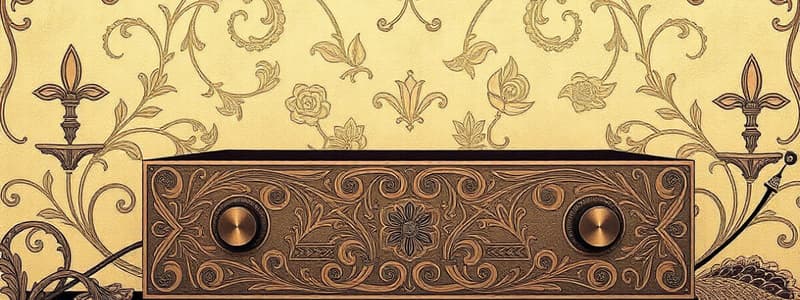Podcast
Questions and Answers
What type of wave is typically used in frequency-based analog-to-digital converters?
What type of wave is typically used in frequency-based analog-to-digital converters?
What component counts the cycles of the frequency signal in an analog-to-digital converter?
What component counts the cycles of the frequency signal in an analog-to-digital converter?
What signal does the computer send to initiate a conversion cycle in a frequency-based ADC?
What signal does the computer send to initiate a conversion cycle in a frequency-based ADC?
Which device is commonly used as a voltage-to-frequency converter in frequency-based ADCs?
Which device is commonly used as a voltage-to-frequency converter in frequency-based ADCs?
Signup and view all the answers
What operation does the one-shot multivibrator perform in an analog-to-digital converter?
What operation does the one-shot multivibrator perform in an analog-to-digital converter?
Signup and view all the answers
What is the typical output voltage range for a bipolar DAC?
What is the typical output voltage range for a bipolar DAC?
Signup and view all the answers
What binary method is common in DACs to represent numbers?
What binary method is common in DACs to represent numbers?
Signup and view all the answers
How does increasing the number of bits affect conversion resolution in a DAC?
How does increasing the number of bits affect conversion resolution in a DAC?
Signup and view all the answers
What is required to establish the output voltage range and resolution of a DAC?
What is required to establish the output voltage range and resolution of a DAC?
Signup and view all the answers
What is the function of a data latch in a DAC?
What is the function of a data latch in a DAC?
Signup and view all the answers
What is the conversion time for a DAC to perform its function?
What is the conversion time for a DAC to perform its function?
Signup and view all the answers
What type of power supply is commonly used for bipolar DACs?
What type of power supply is commonly used for bipolar DACs?
Signup and view all the answers
What is the main principle behind frequency-based converters?
What is the main principle behind frequency-based converters?
Signup and view all the answers
Study Notes
Bipolar DAC
- Bipolar DACs output voltages ranging from positive to negative values, dependent on input binary ranges.
- While computers often use 2's complement for negative numbers, DACs commonly use offset binary.
- In offset binary, the output is centered around half the reference voltage.
- The bipolar DAC relationship equation is: Vout = (N / 2n) * VR - VR / 2
Example Bipolar DAC
- A 10-bit bipolar DAC with a 5V reference,
- Input 04FH (decimal 79) produces -2.11V output.
- Input 2A4H (decimal 676) yields 0.80V output
- Input 512 (decimal) results in a zero output voltage
Conversion Resolution
- Conversion resolution depends on reference voltage and the number of bits.
- Increased bits mean smaller output changes for corresponding binary word changes.
- This leads to better resolution, with smaller output changes between values.
- The smallest possible change in output is calculated as: ΔVout = VR / 2n where:
- ΔVout = smallest possible change in output
- VR = reference voltage
- n = number of bits in the word
Example Resolution Calculation
- For a reference voltage of 10V and a desired output change of 0.04V or less,
- the required number of bits (n) is 8.
DAC Block Diagram
- Digital Input: A parallel binary word with the number of bits defined in the device specifications.
- Power Supply: Bipolar supply between ±12V and ±18V is common. Some DACs use single-supply.
- Reference Supply: Provides the voltage range and resolution for the converter, must be stable and low-ripple. Some integrate internal references.
- Output: Represents the digital input as a voltage.
- Data Latch: Many DACs have an internal latch to hold input data
- Conversion Time: Conversion is virtually instantaneous.
Frequency-Based Converters
- Analog sensor signals can be converted to digital, using sensor signals to produce variable frequency, then counting for a set time
- Counter output measures frequency, representing the sensor signal.
Frequency-Based Converter Diagram/Description
- Sensor signal to frequency converter for proportional frequency (e.g. frequency converted from a square wave).
- The outputted frequency to a counter.
- The device counts the rising/falling edges to identify an entire cycle.
- Counter operation often includes a latch to hold outputs while the counter continues to count.
Frequency-Based Converter Operation Cycle
- Conversion starts with a start-convert signal from the computer.
- The counter resets and triggers a one-shot multivibrator (MV).
- MV produces a defined duration pulse (a start/stop signal for the counter).
- The falling edge signals the conversion's completion (EOC).
- The computer can read the latch value using a RD signal.
Sensor to Frequency Converter (LM 331)
- The LM331 is a common voltage-to-frequency converter.
- Useful for frequency-based ADCs
- Output frequency (fout) is related to input voltage (Vin): fout = Vin / (RLC ⋅ 2.09)
555 Timer
- The 555 timer is for frequency generation dependent on resistance and capacitance values
- Frequency depends on component values: f = 1 / [0.693(RA + 2RB)C]
Studying That Suits You
Use AI to generate personalized quizzes and flashcards to suit your learning preferences.
Related Documents
Description
Explore the intricacies of Bipolar DACs through this quiz, which covers output voltage ranges, input binary formats, and conversion resolutions. Gain a better understanding of how offset binary operates compared to 2's complement, along with practical examples of voltage outputs. Test your knowledge on key concepts and calculations related to Bipolar Digital-to-Analog Converters.




